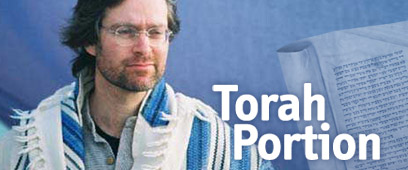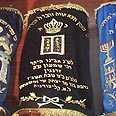

God responds in the affirmative and is willing to embrace his people
Photo: Micha Doman, courtesy of Chabad Center, Tel Aviv
We are taught by the language of our culture that repentance – the Hebrew word "teshuva" literally means "the answer" - is what takes us into the Divine space. Those who take on religious observances are said in Hebrew to "return with answers,” a process that is considered to bring us closer to God.
The other way, those who abandon observant Judaism are called in Hebrew "those who once again ask questions," and again the opposite is said to be true: those who "return with questions" leave the Divine space.
But is it true? The bible indicates there is sometimes a core spiritual obligation of returning to question!
Justifying God
“The Rock, His work is perfect; for all His ways are justice; a God of faithfulness and without iniquity, just and right is He." (Deut: 32:4) This funeral text is a direct quotation from Moses' farewell oration to the Jewish people at the end of the Book of Deuteronomy.
But is that all we can say before an open grave? To affirm the justice of God? Do we respond to pain with theology? Is not the responding to pain with a theological affirmation not the very sin of Job's friends who respond to his suffering by justifying God?
The talmud itself declares that such a response is considered verbal abuse and forbidden according to Torah law. So what is the nature of this strange theological declaration before the open grave?
Ways and justice
The two key words in the text are "ways" and "justice." The personality in the text is Moses. Let's re-read the sentence – could there be a hidden echo in it, a deeper layer of meaning that can be uncovered by a closer reading?
Moses refers to God’s “ways” only one other time: In this week’s parsha, when he stands before God after the sin of the Golden Calf, seeking atonement for the children of Israel.
God responds in the affirmative and is willing to embrace his people once more despite their betrayal. But for Moses this is not enough. Moses demands, in a cry which resounds throughout the centuries: “God, show me your ways.”
What is Moses asking for? What does Moses want from God, above and beyond a full relationship with the Jewish people? With audacity and daring, the rabbis of the Talmud interpret the text: Moses is challenging God, saying ‘“The righteous suffer; the wicked prosper" (Brachot 7a).
In other words, Moses cries out, "God, Your world is not fair. Do You not know about the widows, do You not know about the orphans? Don’t you know about the wells of tears shed by your children every day? Show me your ways."
Challenging God
In biblical consciousness prophecy is the highest level of human perfection, and here the ultimate prophet, Moses, is operating at the height of his prophetic powers.
Our close reading of the text has revealed that the Torah considers this moment to be no less than the zenith of human spiritual enlightenment - in the language of the mystics, it is “the Highest."
At this moment does Moses embrace God with clear theological proofs of divine perfection? Does he, in ecstasy, move to a higher level of meditation? No. At the highest level of human spirituality, Moses challenges God. He cries out in question and demands a response.
The Torah understands this challenge not as a movement away from God, but as the quintessential movement towards God. The question becomes the embrace; the grip of the wrestler becomes the most powerful expression of Jewish spirituality.
Justice and doubt
Return with me now to the funeral text from Deuteronomy. “God’s ways are justice.” On one level, Moses, parting with the Jewish people as they are about to enter Canaan without him, is affirming that God’s “ways” are just. His statement is one of core certainty in God.
On another level, the word “ways” echoes with the challenge and the question of Moses’ previous usage of the same word: “God, show me your ways.”
Proclamation of divine justice interweaves with doubt: "God, I demand you explain how Your world operates.’ There is deliberate literary ambiguity, a delicate balance of uncertainty and affirmation in Moses’ words.
We have thus far tried to detect the dialectic tension in the word “ways.” Now let us return and listen closely to the biblical echoes of the second key word in our primary text: justice.
Abraham and Noah
The Torah says the personification of justice is Abraham. “I know that Abraham represents the attribute of justice and that he will transmit justice to his children,” says God (Genesis 18:19).
Indeed, Abraham's reputation for being just is what, according to this text, moves God to choose him as His messenger. The Zohar suggests that Noah challenged Abraham for the job of spreading the ethical message of God in the world.
However, as we know, when God threatened to destroy the world, Noah did not challenge or rage. He simply followed orders and built the ark. Had Noah been anything but silent, compliant, and obedient, he would have become God’s messenger and the father of the Jewish people.
As it was, Noah’s inability to protest led the prophet Isaiah to find him culpable, naming the devastating flood which destroyed the world, “the waters of Noah.” (Isaiah 54:9)
Abraham and justice
But where do we see Abraham associated with justice? The answer lies in his moment of great uncertainty, when he challenges God over the destruction of Sodom.
It is through his dramatic challenging of divinity and his demand of justice, even from God, that Abraham merits the accolade of being God’s chosen one.
On hearing that God intends to wipe out Sodom, Abraham does not lower profile, retreat into easy piety, or batten down the hatches lest his house be damaged in the blast.
Rather, Abraham stands at the potential open grave of thousands of people, albeit wicked people, and says to God: “Will you who are judge of the entire world not do justice?” Abraham rejects easy certainty even when offered by God himself. Instead he challenges God, and in so doing embodies justice.
Thus Moses’ phrase, “(God) is the rock; his work is perfect, for all his ways are justice,” contains both embrace and challenge. Not by accident was this ambivalent phrase adopted by the Jewish community as the text recited before the open grave. It is at this moment that we embrace God, even as the deepest divinity in our human soul demands that we wrestle and that we question.















